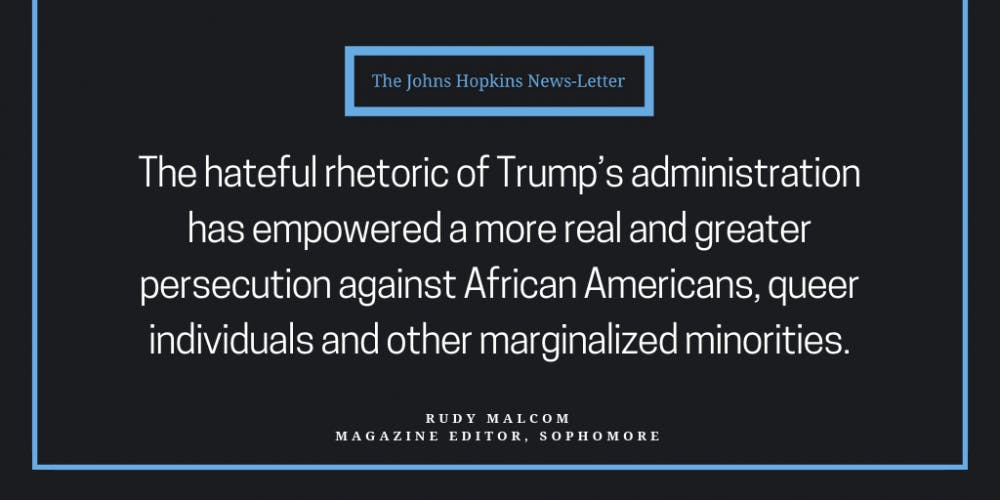Black gay actor and activist Jussie Smollett told police that he was attacked on Jan. 29 by two men shouting racist and homophobic slurs. In a follow-up interview, Smollett said one of them also yelled, “This is MAGA [Make America Great Again] country.” On Monday, the Chicago Tribune reported that Smollett had received a letter a week before saying, “You will die black fag,” with “MAGA” written as the return address.
According to a statement released by the Chicago Police Department (CPD), the two men poured unknown chemicals on Smollett and put a noose around his neck. Kamala Harris and Cory Booker both called the alleged attack “an attempted modern-day lynching.” The Anti-Defamation League (ADL) describes the noose as “one of the most powerful visual symbols directed against African-Americans.” It harkens back to the late 19th and early 20th centuries, when Southern Democrats used lynching to suppress black suffrage and when white planters used lynching to terrorize former slaves into subservience. Smollett’s attackers seem to believe that returning to the era of Jim Crow would fulfill Trump’s wish to “Make America Great Again.”
On Jan 31., Trump said of the attack: “It doesn’t get worse.” I applaud him for that. But I am appalled that, instead of remarking on the attackers’ reported allusion to his own campaign slogan or condemning their bigotry, he milked an alleged hate crime to make another pitch for his border wall.
“What I think is the worst sin of all is the fact that we’re allowing people to come into this country and sell drugs and human traffic and do all of these horrible things,” he said at a press conference. “If we had the simplicity of a well-constructed, beautiful barrier or wall, they wouldn’t be able to come into our country.”
Trump wants simplicity, so let’s be simple: As Smollett’s family said in a statement, “Hateful words lead to hateful actions.” And as Smollett told Essence, he “is not and should not be looked upon as an isolated incident.” Smollett receives a lot of media coverage because he is a celebrity, but let’s take a look at the bigger picture. The hateful rhetoric of Trump’s administration has empowered a more real and greater persecution against African Americans, queer individuals and other marginalized minorities. Right after the election, for instance, a black woman in Abingdon, Md., found a note on her car that said, “Go back to Africa Bitch! You better watch your back!! Trump 2016. Make America WHITE AGAIN!”
Doron Erickson, regional director of the ADL for Washington, D.C., told The Baltimore Sun that the normalization of hate speech has encouraged a growth in hate crimes, citing a November report from the Federal Bureau of Investigation (FBI) detailing a 17 percent rise in hate crimes nationwide from 2016 to 2017. Victims were primarily targeted for their race, ethnicity, religion and sexual orientation.
Smollett told Essence he believes “that justice will be served.” I’m fairly sure it will be for him; the CPD seems to be hard at work. But would the CPD be that diligent if Smollett weren’t in the spotlight? In 2017, the U.S. Department of Justice (DOJ) found that CPD officers often readily used excessive force, especially against African Americans and Latinos. In response, the Chicago Tribune reported, Chicago Mayor Rahm Emanuel said, “Misconduct not only harms the individuals affected, it damages the reputation of the CPD.” Emanuel seems to prioritize fixing the department’s image over fixing the systemic subjugation of his constituents.
Is the Baltimore Police Department (BPD) all that different? The Department of Justice also concluded in 2017 that the BPD frequently violated residents’ civil rights, particularly those of minorities. In compliance with subsequent federal mandates, the BPD will start retraining officers on impartial policing and the use of force. Yet, according to the training plan itself, there is no reliable mechanism to assess whether the training is effective. The DOJ found in June that the BPD’s computer systems depend “entirely on manual data entry.”
The BPD received $5 million for new cameras from Michael Bloomberg — a staunch advocate of a Hopkins private police force whose stop-and-frisk policy as New York City mayor disproportionately targeted black and Latino men — in 2017. The cameras are meant to enhance the department’s ability to detect and respond to gunfire incidents. On its website, the BPD expresses its belief that the software will “deepen trust and collaboration between the Department and communities affected by gun violence,” noting that the “vast majority of gunfire discharges go unreported.” But how useful is this donation? The new technology isn’t directly addressing the root cause of under-reporting: a lack of faith in the BPD that often dissuades victims of hate crimes from reporting — that exists because of the BPD’s record of civil rights injustice.
Samuel Walker, a professor emeritus of Criminology and Criminal Justice at the University of Nebraska, Omaha, described the BPD’s training program as a “major cultural change.” However, this new technology isn’t going to solve the public’s distrust in the police. Bloomberg’s donation is misplaced and reminds me of Trump’s advocating a wall on the border in response to a possible hate crime in Chicago (read: against Smollett). Bloomberg should now direct his wealth toward implementing technology that can expedite data analysis and evaluate the efficacy of the BPD’s new training program. Doing so would not only bolster his potential presidential bid but also help tackle the rising tide of hate crimes in Chicago, Baltimore and the rest of “MAGA nation.”
Rudy Malcom is a sophomore double-majoring in Writing Seminars and Psychology from Port Washington, N.Y. He is one of the Magazine Editors.

















